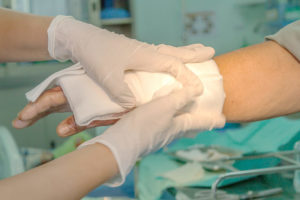 One of the most painful decisions a son or daughter must make is determining when it is time to help a family member enter a skilled nursing home facility. It can be hard to accept, but there often comes a point in time when a skilled facility with medical resources is necessary to help a loved one cope with the physical or mental limitations of an illness or medical condition.
One of the most painful decisions a son or daughter must make is determining when it is time to help a family member enter a skilled nursing home facility. It can be hard to accept, but there often comes a point in time when a skilled facility with medical resources is necessary to help a loved one cope with the physical or mental limitations of an illness or medical condition.
When that time comes, all you can do is your due diligence to make sure that the home you choose meets the quality of life and medical standards your family member deserves. You may have done your research and learned all about nursing home abuse statistics, the signs of physical and mental abuse, the symptoms of abandonment or neglect. Regrettably, there is another form of abuse that you may not have come across – a silent killer that doesn’t get the same recognition as something along the lines of physical abuse. It is improper wound care, something easily overlooked, but potentially deadly in a slow and painful process.
Wound care is much more than simply throwing a bandage over a cut. Wound care can be an in-depth process that requires skilled medical knowledge, patience, and cleanliness. Neglecting open wounds or failing to treat them properly can be a form of nursing home abuse, and it can cost patients their limbs, even their lives.
At Minner Vines Injury Lawyers, PLLC we have the understanding and experience needed to handle a wide range of nursing home abuse claims from physical and sexual abuse, to the less talked about but the equally disturbing practice of improper wound care. Contact our Kentucky nursing home abuse lawyers today at (859) 550-2900 to learn about your legal options.
What Is Wound Care?

A wound is any type of disruption or injury that breaks the skin or other body tissues. A wound may be considered a cut, scratch, scrape, puncture, bedsore, or diabetic ulcer. A wound may also be the result of a medical procedure or surgery, such as an incision wound that has been stitched up or a skin graft. Wound care or wound management is the proper cleaning and treatment of these injuries. Wounds require constant monitoring and daily maintenance, especially in the elderly, since they are more prone to infection. The type of wound care needed to maintain a healthy healing process depends on the cause, type, and location of the wound.
Improper wound care may consist of neglecting a patient’s bedsores or failing to clean, disinfect, and administer proper bandaging. Improper wound care may include a caregiver failing to follow a doctor’s explicit instructions in wound management. Poor wound care may also include caregivers failing to provide elderly residents with medication that could manage wound infections.
Nursing home caregivers responsible for wound care have a duty to provide a standard of care to their residents. Depending on the circumstances, this lack of care could be a result of nursing home abuse and neglect or even malpractice. An experienced attorney with Minner Vines Injury Lawyers, PLLC will be able to sort through the facts of your case and determine what legal avenues are open to you and your family.
What Are the Signs of Improper Wound Care?
Since many wounds are often covered by a bandage or clothing, it may be difficult at first glance to identify the warning signs of improper wound care. If a loved one has untreated bedsores, or you notice they keep getting recurrent infections, your loved one may be the recipient of negligent and improper wound care at the hands of a nursing home caregiver. It is important to watch for some of these common warning signs of improper wound care:
- Dirty or uncleaned wounds
- Dirty or unchanged bandages
- Open wounds or bedsores with no bandaging
- Debris in the wound
- Pus or oozing
- Infections
- Change in surrounding skin color, discoloration
- Bad odor coming from the wound
- Maggots in the wound
- Pain
One medical study found that in the United States, 70 percent of all pressure ulcers or bedsores occurred in the geriatric population. Failing to take these wounds seriously and treat them properly could significantly alter the life of an elderly nursing home resident.
Untreated Infection Causing Sepsis and Death
When an infection is left untreated, sepsis and, subsequently, death may result. If you suspect that a loved one is dealing with an infection, it is crucial to seek medical attention as soon as possible.
Symptoms of an untreated infection may include the following:
- Fever
- Chills
- Shortness of breath
- Pain
- Confusion
- Swelling
- Redness
- Fast breathing
If these symptoms and underlying infection are left untreated and sepsis develops, it can be catastrophic or even fatal.
Consulting a Kentucky nursing home abuse lawyer if your loved one contracts an infection that is left untreated while in a nursing home can help make this unimaginable time more manageable.
Complications From Improper Wound Care Treatment in Kentucky
 Wounds that are neglected or improperly treated may start out small. A bedsore that isn’t properly cared for may seem like a trivial thing to an overwhelmed caregiver. Unfortunately, the complications that can arise from a neglected or improperly treated wound, even a small one, can result in dangerous medical complications and even death.
Wounds that are neglected or improperly treated may start out small. A bedsore that isn’t properly cared for may seem like a trivial thing to an overwhelmed caregiver. Unfortunately, the complications that can arise from a neglected or improperly treated wound, even a small one, can result in dangerous medical complications and even death.
Left untreated for an extended period of time, an improperly treated wound can become infected, infested with maggots or other parasites, and eventually turn necrotic. Necrosis means that cells and body tissue have died and that the tissue no longer has a viable blood supply. Gangrene is the death of bodily tissues due to a lack of blood flow or serious infection. Gangrene typically impacts the extremities such as toes, feet, fingers, hands, and limbs.
Necrotic tissue anywhere on the body or gangrene impacting the limbs cannot be reversed; the only solution is to amputate the dead areas. Necrotic tissue, gangrene, and seriously infected wounds can all lead to sepsis. Sepsis is the body’s reaction to extreme shock. The body will flood the bloodstream with chemicals meant to fight the infection, but the result is an increase in inflammation. This inflammation can severely damage internal organs and may lead to septic shock. Septic shock is when the body goes through a significant drop in blood pressure, which can result in heart or respiratory failure, stroke, or death.
The elderly are particularly susceptible to infections and sepsis because of the natural decline in their immune system response. They are also at risk because many elderly residents have pre-existing medical conditions as well. Improper wound care can lead to an entire host of new medical complications and serious, life-threatening conditions. These can include:
- Infection
- Infestation
- Amputation
- Sepsis
- Septic shock
- Tissue death
- Gangrene
- Wrongful death
Contact a Kentucky Nursing Home Abuse Law Firm Today
If not addressed, the ramifications of improper wound care can be life-threatening. You have put your trust in a skilled nursing home facility because you believe they are better able to handle the medical concerns you have for your family member. When a facility fails to uphold that standard of care, they can be held accountable.
If you or a loved one has suffered from improper wound care in a nursing home facility, the legal team at Minner Vines Injury Lawyers, PLLC may be able to help you recover compensation. Your family is entitled to proper medical treatment, not negligent wound care. Contact Minner Vines Injury Lawyers, PLLC today at (859) 550-2900 to schedule a consultation to review your case.